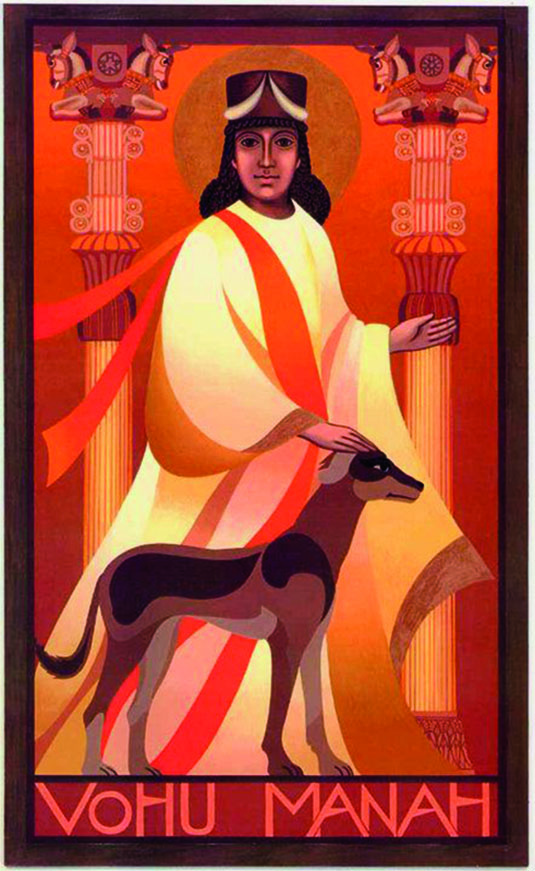 In the pantheon of Zoroastrian Divinities, Bahman Ameshaspand (Avesta Vohu Mana) ranks next to Ahura Mazda. Bahman, an Amshaspand or Amesha Spenta (translated as Bountiful Immortal or Arch Angel), is doctrinally regarded as guardian of one of Ahura Mazda’s good creations, namely Animals – particularly Goshpand like cow, goat, sheep etc. This is why devout Zoroastrians abstain from eating meat through the month of Bahman. But there’s more to Bahman Amshaspand than guardianship of bovine animals. If Ahura Mazda is the Wise Creator, Vohu Mana is the Good Mind of the Creator.
In the pantheon of Zoroastrian Divinities, Bahman Ameshaspand (Avesta Vohu Mana) ranks next to Ahura Mazda. Bahman, an Amshaspand or Amesha Spenta (translated as Bountiful Immortal or Arch Angel), is doctrinally regarded as guardian of one of Ahura Mazda’s good creations, namely Animals – particularly Goshpand like cow, goat, sheep etc. This is why devout Zoroastrians abstain from eating meat through the month of Bahman. But there’s more to Bahman Amshaspand than guardianship of bovine animals. If Ahura Mazda is the Wise Creator, Vohu Mana is the Good Mind of the Creator.
Mind Of The Universe
Is Bahman the Mind of the Universe? It well could be! Ahura Mazda is the Wise Creator who dwells in Creation. Vohu Mana (Bahman) is the Good Mind of the Creator. Thus, Creation or the Universe has a Good Mind (Vohu Mana) which ensures that Divine Order (Asha Vahista) is maintained. Hence, Zoroastrians revere all good creations.
As to whether Bahman is the Mind of the Universe, we first need to understand mind and matter. Mind is not separate from matter – it’s a process embodied in matter… in this case, the matter constituting the human brain. Once we understand that the mind is the activity of the evolved brain, it radically transforms our view of the mind’s place in the universe and our view of the universe itself. The physical universe ceases to be an unconscious object that is observed, and explored by conscious minds, which somehow stand above or outside it. Conscious minds are instead a part of the universe, and thus the universe itself is conscious, with a mind of its own.
When we contemplate the universe, part of the universe becomes conscious of itself. In the words of Carl Sagan: “Humans are the stuff of the cosmos examining itself.” Darwin’s theory of evolution explains how clumps of matter could come to be organized in such a way that they are able to examine and understand themselves and the rest of the cosmos.
Monsoon Myth
Some Parsis in India throw in a scientific angle as regards why we maintain vegetarianism during Bahman Mahino, which falls as per Shahanshahi calendar, during the Indian monsoon season… The high moisture content in the air during the monsoons enables harmful micro-organisms to thrive, resulting in the transmission of several diseases, particularly the Foot and Mouth, Anthrax, Black Quarter and Hemorrhagic Septicemia. While it’s true that during the rainy season, bovine animals stand a greater risk of being exposed to multiple viruses, bacteria, and other infections than in any other season, this argument does not hold much water from a religious perspective. This is because while the month of Bahman lasts for just thirty days, the monsoon seasons lasts around four months. Hence, Zoroastrians, from a health and scientific point of view should abstain from eating meat for not one but four months. Are we ready?
Moreover, as per the Fasal or seasonal calendar, the month of Bahman commences around mid-January. These are months of intense cold in the northern regions, particularly in Iran. Imagine abstaining from chicken soup and kharia (trotters) during bitter winters, when even fruits and vegetables are scarce and there’s less grass for bovine animals to graze. Thus, let’s respect longstanding customs and traditions, but not mix religion with pseudo-scientific theories.
Key To Wisdom And Happiness
Bah-man literally means good mind (Bah or Beh = Good and Man = Mind). If the Zoroastrian religion is about Ushta or happiness, having the right mindset is the key to happiness. Our happiness depends on our mindset and attitude. This is because our mind has a powerful way of attracting things that are in harmony with it, be it good and bad. Hence, keeping the mind positive is considered meritorious.
Also, it’s only through Bahman or the good mind that Mazda or wisdom can be attained. Little wonder that in the Divine hierarchy, Bahman is second only to Mazda. In the Gatha, Asho Zarathushtra asserts that the path leading to Ahura Mazda is through Vohu Manah. In other words, propitiating Bahman Amshaspand takes one closer to Divinity. Interpreted at an ethical level, exercising the right moral choices with the help of the good mind alone can take one closer to Ahura Mazda – the Lord or Master of all Wisdom.
What To Pray?
There is no Yasht (Hymn) or Niyaesh (Litany) dedicated to Bahman. There probably was an Avesta Vohu Manah or Bahman Yasht, which is now lost to us, over time. We have a Pahlavi commentary, called Zand-e-Vohu Manah Yasna. However, unlike Avesta and Pazand, Pahlavi is not Manthravani or the traditional language of prayer. Praying Mah Bokhtar Nyaish, Mah Bokhtar Yasht, Gosh Yasht and Raam Yasht during this month is also considered meritorious since Mah, Gosh and Raam are hamkara or co-workers of Bahman
Dietary Restrictions
For Zoroastrians, Bahman Mah is what Shravan is to Hindus. Just as Hindus avoid non-vegetarian food Shravan, Zoroastrians do likewise during Bahman Mah. However, while Hindus also observe fasting during the month of Shravan, Zoroastrians do not.
Historically, Zoroastrians do not seem to have been a vegetarian community. In fact, one of the strongest arguments supporting the non-vegetarian theory is the observance of Bahman Mah. It is often argued that if Zoroastrians are mandated by religious tradition to be vegetarian all year round, why is a devotee required to be vegetarian for this month only?
Attaining Happiness
In the Gatha, Asho Zarathushtra urges us to attain happiness through wisdom, which in turn can be achieved by reflective thinking and exercising moral choices within an ethical framework. Zarathushtra’s philosophy focuses on using our mind for constructive (not destructive) choices. The term philosophy itself comes from the Greek words – Philo (meaning friend or lover) and Sophia (meaning wisdom). Thus, philosophy is the love of wisdom and a philosopher is a friend (or lover) of wisdom. May this holy month inspire us to befriend wisdom and attain happiness!
- Moon And Moods - 22 February2025
- The Joy Of Giving - 15 February2025
- Celebrate A Joyful Week Of Love - 8 February2025
